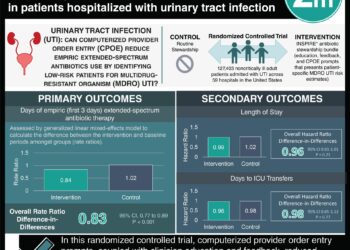#VisualAbstract: A Trial of a Shorter Regimen for Rifampin-Resistant Tuberculosis
1. A randomized control trial of patients with multidrug resistant tuberculosis found that shorter treatment regimens were noninferior to longer treatment regimens currently recommended by the WHO.
2. Severe adverse events were noted in both arms including death, QT interval prolongation and increases in alanine transaminase (ALT) levels.
Evidence Rating Level: 1 (Excellent)
Study Rundown: Multidrug resistant tuberculosis requires aggressive treatment as it is resistant to two mainstay tuberculosis drugs – isoniazid and rifampin. In 2011, the World Health Organization (WHO) published a report indicating that long-term treatment lasting 20 months in duration was needed for disease management, however this report was not rooted in high quality analysis. New research has suggested that shorter length, aggressive treatment regimens may prove to be as beneficial in treating resistant tuberculosis as compared to the longer regimen. This current analysis strives to add to the current literature on the comparative effects of short-regimen therapy versus long-regimen therapy for patients with multidrug resistant tuberculosis. Researchers analyzed results from patients across sites in Ethiopia, Mongolia, South Africa and Vietnam, finding that short regimens of 9 to 11 months long were noninferior to longer regimens based on the number of participants in each arm that had negative M. tuberculosis cultures after 132 weeks post-randomization. Researchers also found that both arms were associated with adverse events, including QT interval changes and elevation in liver function test results. Overall, while these results suggest that shorter regimens of treatment may be as effective as longer treatment regimens, additional research is required to ensure the overall safety and efficacy of this treatment plan.
Click to read the study in NEJM
©2019 2 Minute Medicine, Inc. All rights reserved. No works may be reproduced without expressed written consent from 2 Minute Medicine, Inc. Inquire about licensing here. No article should be construed as medical advice and is not intended as such by the authors or by 2 Minute Medicine, Inc.



![Teixobactin appears to avoid bacteria resistance [PreClinical]](https://www.2minutemedicine.com/wp-content/uploads/2015/01/18170_lores-350x250.jpg)



